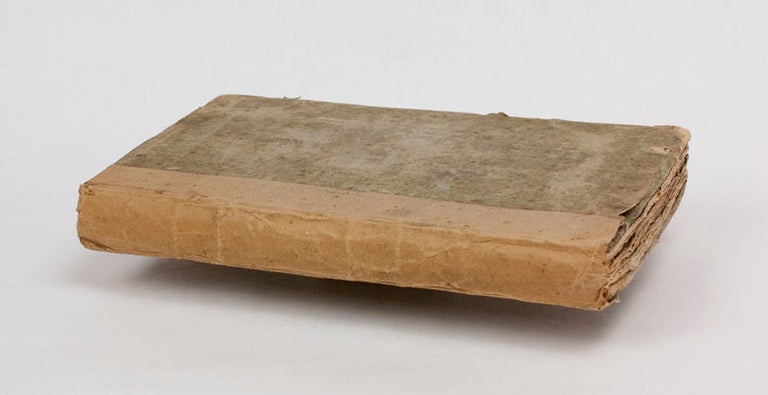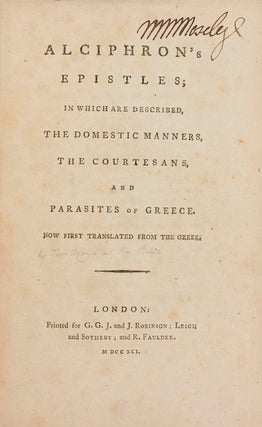Uncut in Boards
Alciphron's Epistles;. In Which are Described, The Domestic Manners, The Courtesans, and Parasites of Greece. Now First Translated from the Greek.
London: Printed for G.G.J. and J. Robinson; Leigh and Sotheby; and R. Faulder. 1791.
BELOE, William, translator]. [MONROE, Thomas, translator].Alciphron's Epistles; In Which are Described, The Domestic Manners, The Courtesans, and Parasites of Greece. Now First Translated from the Greek. London: Printed for G.G.J. and J. Robinson; Leigh and Sotheby; and R. Faulder. 1791.
First English edition. Octavo (8 3/4 x 5 3/4 inches; 222 x 144 mm). [6], 270, [4, blank] pp. With the half-title containing errata on the verso.
Quarter newer beige paper over original drab boards. Uncut. Boards rubbed. Inner joints of boards cracked. With a 2 1/2 x 1 1/2 inch marginal tear on leaf P8, a1 1/2 inch closed tear on leaf S3 and a 3 1/2 inch closed tear on leaf S4, none affecting text. Overall a very good copy.
"Alciphron, a Greek sophist, and the most eminent among the Greek epistolographers... we may safely infer that Alciphron was a contemporary of Lucian — an inference which is not incompatible with the opinion, whether true or false, that Alciphron imitated Lncian. We possess under the name of Alciphron 116 fictitious letters, in 3 books, the object of which is to delineate the characters of certain classes of men, by introducing them as expressing their peculiar sentiments and opinions upon subjects with which they were familiar. The classes of persons which Alciphron chose for this purpose arc fishermen, country people, parasites, and hetaerae or Athenian courtezans. All are made to express their sentiments in the most graceful and elegant language, even where the subjects are of a low or obscene kind. The characters are thus somewhat raised above their common standard, without any great violation of the truth of reality. The form of these letters is exquisitely beautiful, and the language is the pure Attic dialect, such as it was spoken in the best times in familiar but refined conversation at Athens. The scene from which the letters are dated is, with a few exceptions, Athens and its vicinity ; and the time, wherever it is discernible, is the period after the reign of Alexander the Great The new Attic comedy was the principal source from which the author derived his information respecting the characters and manners which he describes, and for this reason these letters contain much valuable information about the private life of the Athenians of that time. (Dictionary of Greek and Roman Biography and Mythology, Smith, 103).
HBS 64603.
$750.
Price: $750.00
Item #64603


